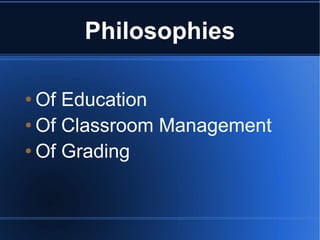
3 Philosophies
- 1. Philosophies Of Education Of Classroom Management Of Grading
- 2. Like a Ladder Teaching philosophy needs a secure footing – classroom management Teaching philosophy needs good anchors - tests and measurements Tests and measurements need sound philosophy of grading behind them to keep the right pitch at all times.
- 3. Like A Flow Chart Classroom management philosophy sets a logical base Philosophy of education helps students design good questions Philosophy of grading insures input error checking and allows corrections
- 4. Philosophy of Classroom Management Set clear behavior expectations in the first class. Base expectations on School and State policies. Set consequences. Set the way behavior will be monitored, dealt with and consequences applied right at the beginning. Allow flexibility to be able to deal with individual needs and circumstances.
- 5. Application of Philosophy of Classroom Management Be observant − Be aware of circumstances in students' lives that might have impact on behavior. − Be in close proximity to students whenever possible to enhance observations and make quick adjustments for them in Giving opportunities to succeed before receiving consequences. Adjusting environment to help deal with proximity between students that might be pushing the situation. Adjusting physical environment to prevent sleepiness, stress, etc.
- 6. Critical issues in Classroom Management Adhere to parameters throughout year – a teacher who is inconsistent will end up like a reed broken by the wind and the classroom management will not be recoverable. Always deal with the issues in a gentle but firm manner. Avoid emotional entanglements or arguments in class Be ready to call for school security or transfer the problem to security if it is out of my ability to handle.
- 7. The foundation has been laid. Now What? How do I adjust the foundation for special needs students without compromising classroom control? How do I start the teaching from different foundations or different types of ground for different students?
- 8. Is designed to develop the ability to learn not just to store information. Is the flow chart for learning and will allow for variations in learning style, ability, and differences as well as other circumstances. Philosophy of Education
- 9. Know each student Get to know each parent Constantly be on the look out for changes in each student that will require changes in teaching techniques to allow the student to learn to learn. Like setting the stage for success. Charting a path for each student
- 10. Intervention – Applying Test and Measurements to insure the path is correct for each student Set a baseline for each student at beginning of course with a knowledge test – no grade. As they progress, test to see if they are keeping up with the pace of the class and reaching and standing firmly on the ladder's platforms.
- 11. Intervention – Applying Test and Measurements to insure the path is correct for each student Make adjustments to materials, delivery methods, and assignments to fit needs of each student so each student can reach the next test or platform along with the rest in the class
- 12. Grading Philosophy Use Tests to determine understanding of principles underlying the actions needed to succeed in my courses. Use projects and observation to determine if the concepts have gotten from head to hands.
- 13. Grading Philosophy Be willing to adjust grades for all students on the validity of the tests. Be firm on grades given if tests have been evaluated for authenticity, accuracy, and applicability and have passed muster.
- 14. Grading Philosophy Always give the students the rubrics needed for them to be able to evaluate their own work on projects. This insures better understanding of the work done, and less room for maneuvering around the teacher if the student doesn't like a grade assigned.
- 15. Grading Philosophy Stick to the rubric every time. Unless I evaluate the rubric and find it faulty. Then adjust it and explain the changes to the class if it close to the beginning of the project. If not, drop the grade on the worst project.
- 16. Grading Philosophy Do everything in my power to make sure that all tests and rubrics are properly evaluated before they are given out. Do everything in my power to make sure that all tests and projects are appropriate to the class, the objectives of the class, and the state requirements for the class.
- 17. Grading Philosophy Communicate the why of my tests, projects, and grades early in the course and reiterate before each one is assigned or administered. Remember to think about what is best for each student as I prepare these tools and give the grades.
- 18. Recap Make a stable, warm, community learning environment that is well controlled and looks out for the needs of each student. Be consistent in all things. Find a common starting point for the class to learn together.
- 19. Recap Always make every attempt to reach every child in a way that suits personal learning styles, abilities, disabilities, and general competencies. Use projects and intermittent tests to enhance teaching and evaluate changes that need to be made to insure understanding for each student.